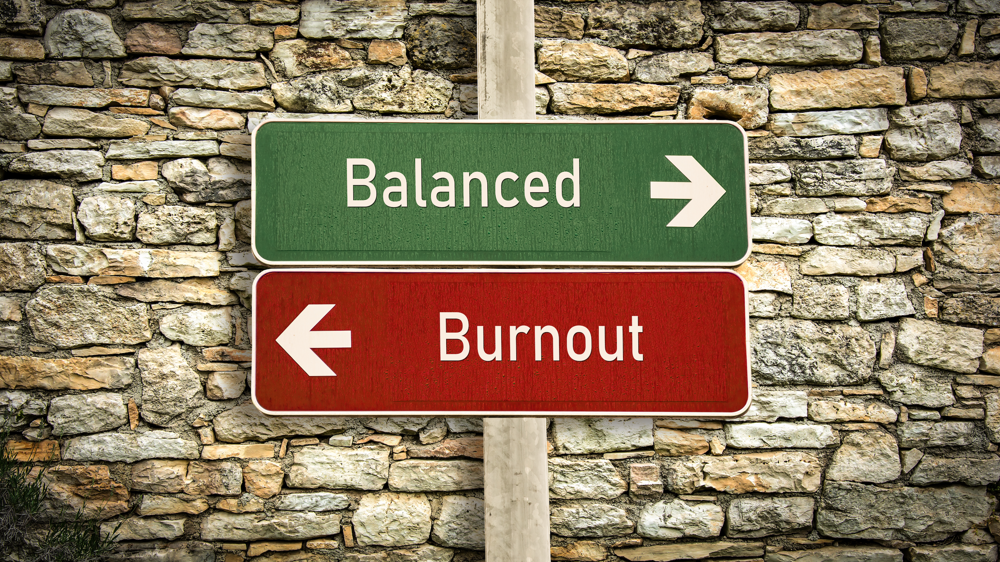How to avoid business owner burnout
6 oct. 2023 Small Business Advice
Often it might feel like business ownership and burnout come hand in hand, especially during a tough economic climate. For landscapers coming out of the busy summer season, it’s the time of year when those extra hours may be starting to catch up with you – so it’s best to get ahead of a potential burnout before it happens.
Burnout can look different from person to person and is something many business owners suffer from. It can be the result of working too many hours a day, not taking effective breaks or pushing your professional capacity too far.
The result? Feelings of exhaustion and depletion, trouble concentrating and experiencing a lack of satisfaction in your work to name a few.
How burnout can affect your business
If you're thinking of just waiting it out and relying on wishful thinking that stress and burnout won't affect you, we'd recommend thinking again. Sadly, it's not just you that will suffer from a period of burnout. As the owner, your mental state can have wider implications for your business.
The frustration that comes with small business burnout can lead to an increase in miscommunication with any staff members you may have or even with clients, as well as the potential for decreased productivity and struggles with prioritisation and decision making. You may find yourself making more silly mistakes or finding projects stall if you don't get ahead of dealing with ongoing stress. We’re all human and we need to prioritise mental health for our own wellbeing, and the wellbeing of those around us.
The good news is that there are steps you can easily add into your daily operations that can help prevent burnout.
1. Effective time management: take control of your schedule
Effective time management is a crucial strategy for landscaping business owners to enhance productivity and mitigate stress.
By creating well-structured schedules, a comprehensive to-do list and realistic deadlines, you can efficiently allocate your resources and focus on high-priority tasks. This approach helps prevent overloading yourself with work and makes sure that essential responsibilities are addressed promptly.
It also provides a clear roadmap for your day-to-day operations, reducing uncertainty and decision-making fatigue while freeing up mental space to tackle challenges more effectively.
There are plenty of to-do list apps that can help with this process or if you prefer a good old fashioned pen and paper, look for a diary format that works for you.
Streamline your operations
As part of effectively managing your time, business owners must streamline systems and processes as much as possible.
It’s time to do an audit and make a conscious effort to get organised. Consider investing in software that centralises scheduling, invoicing and client communication. You may also look into outsourcing some non-core functions such as payroll or marketing to focus on more core landscaping activities.
2. Take time to switch off and recharge

When it comes to running your own business, it can be hard to switch off at the end of the work day. Many business owners struggle to take a break from their passion, but by not stepping away from your work, you might see your personal life – and your health – suffer.
Nine times out of ten, that email can wait until the morning, and your business can survive you working an eight-hour day over a sixteen-hour one. What it's less likely to survive are the negative impacts that can come with burnout.
As well as mental fatigue, not taking appropriate time off can affect your physical wellbeing too. You might find yourself getting ill more often, suffering headaches or even intestinal issues, all of which might push you to take more time off unexpectedly as you recover.
A practical way to start realigning your work-life balance is to switch off your phone and laptop outside of work hours, removing the temptation to check in with the business while off the clock. It's all too easy for a quick glance to suck you into another couple of hours of work without you meaning it to.
Schedule time just for you
Switching off can be easier said than done when you own a business, so take the extra step to actively schedule recuperation time into your calendar. This can be spending time with friends or family, doing a hobby or simply just relaxing.
Having this time written down in your calendar means you're less likely to put it off in favour of work. It will also make it easier to schedule your work tasks around your personal ones so that the two are less likely to interrupt each other.
Keep track of your hours
As a landscaper, your day could look very different depending on the project and client. This can however make it difficult to keep track of the exact number of hours you are actually working. That's not to mention the extra hours running the business side of things: communicating with clients, scheduling projects and managing your team. It soon adds up.
Use an online or even an offline calendar to track your hours and set a boundary that you won't cross. This could be a set number of hours to work each day or a specific point in the day when you transition from work to home. Keep firm with these boundaries and let any employees (if you have them) know not to contact you with work-related business outside of emergencies during your 'off hours'.
3. Learn how to delegate
If you have a team around you, consider handing off landscaping or admin jobs that might be eating your time either on a permanent or temporary basis. It's normal for company owners to want to do the bulk of the work – they know their business best after all – however, it’s not always the most efficient system.
It's helpful to reframe how to think about delegation. You're not giving away control – by handing off small-value tasks, you're giving yourself the headspace to focus on those higher-value tasks that only you can achieve.
Studies have even shown that business owners who delegate can generate 33% more revenue than those who don't. Trusting in your team to lighten the load can have positive benefits for your business and your mental health.
Consider a virtual assistant
A virtual assistant can be a lifesaver for many small business owners, whether they are managing a team of twenty or a team of one.
Virtual assistants can handle various responsibilities that take time and energy out of your day, from answering emails and handling customer enquiries to scheduling appointments and posting to your business's social media.
Entrusting these tasks to a third party frees up space and lets you focus on core competencies, and likely the reason you got into landscaping in the first place.
4. Try and get enough sleep

Getting enough sleep may sound self-explanatory, and it's something we all know we could probably be better at. It's one of the best ways to stave off burnout and counteract energy depletion. For landscapers who often engage in physically demanding work, this becomes even more important.
The average adult needs seven to nine hours of sleep per night to maintain healthy mental and physical wellbeing. But with most people having only an 85-90% sleep efficiency – meaning they are actually still awake roughly 10-15% of the night – you'll need to be in bed for around nine and half hours in order to get that precious eight hours of sleep.
The trouble is, if you are used to chronically under-sleeping, actually falling asleep can be hard. Try following the 10-3-2-1 rule:
-
10 hours before bed: no caffeine.
-
Three hours before: no more food.
-
Two hours before: no more work
-
One hour before: no screens, including phones, laptops and TVs.
Remember that something is better than nothing. Even if you don't always manage the full eight hours, putting the effort into getting there will help claw back valuable extra minutes that can make a world of difference to your productivity and overall health. Get to know how much sleep allows you to function at your best and look for ways to achieve that goal.
5. Learn when to say no
It's easier to achieve for some than others. It can be especially difficult when your business is running successfully and it feels like taking your foot off the gas may jeopardise that.
Learning when and how to say no, maybe to a client or to a colleague, will prevent you from becoming overextended and overwhelmed by too many tasks. Setting healthy boundaries around your time and professional capacity will set a good precedent for your business, helping you to mitigate burnout in the short term and in the long run.
This doesn't mean saying no straight away, it just means refraining from giving an automatic 'yes'. Take the time to properly evaluate your current priorities and exactly what the task will need from you. It might be that you can't take on the task in its entirety but you can lend a helping hand or advice.
6. Put it into perspective
Running a business can be trying, but it's also important not to lose sight of why you started in the first place. It can be immensely rewarding to see all of your hard work pay off and something you built flourish year on year.
Remember there would be no business without you. Taking care of yourself, and giving yourself the time and tools to recuperate will benefit your business as much as it will benefit you. Take the necessary steps and the above advice to prevent burnout before it happens.
At Kawasaki Engines, we aim to offer tips and advice that will hopefully make running your business easier and allow you to enjoy a healthier work-life balance. If you’re looking for the right tools to make your job easier and more efficient, explore equipment Powered by Kawasaki.
You may be interested in
-
Comment embaucher en pleine pénurie de main-d’œuvre dans le secteur paysager

-
Social media post ideas for your landscaping business

-
Entretien des espaces verts : comment réaliser de belles photos et vidéos de votre activité

-
Le métier de jardinier-paysagiste : considérations physiques et psychologiques

-
Outils essentiels pour les entreprises d’entretien d’espaces verts

-
Marketing des petites entreprises d'entretien des espaces verts : votre plan marketing sur 1 an







